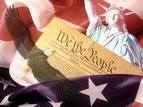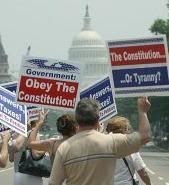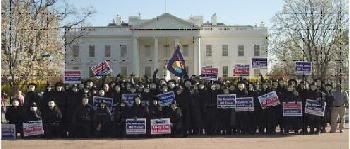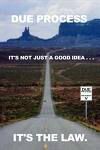Evidence Suggests Ron Paul Was Cheated
A host of curious events at the Iowa Straw Poll at the weekend has raised questions as to whether there was some kind of tampering with the final vote count, with evidence to suggest Ron Paul may have been wrongly placed in fifth position behind Mitt Romney and three second tier candidates.
Read more here.












5 Comments:
I have always wondered about official vote counts in our elections, but clearly its time to make all things politics to be accountable and verifiable by the public outside the main stream control of our processes and our thoughts. Everyone should tell everyone they know, that we are all going to start keeping an eye on all government activities and are going to report it all to the internet until we get our constitution back. A total boycott of all government freedoms. Pass it on.
INTRODUCTION TO QUI TAM:
Qui Tam : An abbreviated version of the Latin phrase "Qui Tam pro domino rege quam pro si ipso in hac parte sequitur," which means "Who sues on behalf of the King, as well as for Himself." In Qui Tam litigation a private citizen (the whistleblower) who knows of fraud committed against the government may, through his own privately retained lawyers, file a law suit to recover the losses caused by the government fraud. The False Claims Act provides huge financial incentives to citizen whistleblowers to retain attorneys and come forward, prosecute these lawsuits and fight government fraud.
I. HISTORY OF QUI TAM PROVISIONS :
Qui Tam laws have existed for hundreds of years, with roots in England in the middle ages. In qui tam provisions the government gives private citizens the right and the financial incentive to retain a private lawyer to file a lawsuit to act in the place of law enforcement.
The Continental Congress in the early days of government in the United States enacted a number of qui tam provisions. Benjamin Franklin has been quoted as saying: "There is no kind of dishonesty into which otherwise good people more easily and frequently fall than that of defrauding the government." Abraham Lincoln, himself a lawyer in private practice before ascending to the Presidency, was responsible for enactment of the 1863 False Claims Act, which was necessary to protect the government from the fraudulent suppliers of faulty war equipment during the Civil War. He stated: "Worse than traitors in arms are the men who pretend loyalty to the flag, feast and fatten on the misfortunes of the nation while patriotic blood is crimsoning the plains of the south and their countrymen are moldering in the dust." Although a significant narrowing of the provisions of the False Claims Act took place in 1943, the law was revitalized by Congress in 1986, with a significant expansion of the scope of the law and renewed attention to the federal whistle-blower and his or her attorney as a key to enforcement.
II. QUI TAM CLAIMS TODAY :
It has been estimated that almost 10% of the United States annual budget is paid to companies or persons who are defrauding the government. Some of them overcharge the government for products sold to the government. Others submit vouchers billing the government for services which they never provided or overbilling for services provided. And still others engage in government contract fraud, defense contractor fraud, Medicare fraud, Medicaid fraud, or other public benefit fraud. The False Claims Act covers a wide variety of situations in addition to overcharging or billing for property or services not delivered. Virtually any situation in which the government has been cheated should be closely scrutinized by experienced Qui Tam lawyers to determine whether it is covered under the False Claims Act. The following are situations in addition to those mentioned above which would be covered under the False Claims Act and for which lawsuits could be brought:
preparing a false record or statement or bill in order to get a false or fraudulent claim paid by the government.
conspiring with anyone else to have a false or fraudulent claim paid by the government.
holding property of the government intending to defraud the government or intending to conceal it from the government.
creating or delivering a false or fraudulent receipt to the government for its property.
fraudulently buying property of the government from someone who is not authorized to sell that property for the government.
making a false statement to fraudulently avoid paying a debt to the government or to avoid delivering property to the government.
causing someone else to submit a false or fraudulent claim.
To combat fraud committed against the government, Congress passed the False Claims Act, which, as noted above, was amended and significantly strengthened in 1986. Between 1987 and 1995 lawyers filed over a thousand qui tam lawsuits. For the period 1988 to 1995 alone, over a billion dollars was recovered by private Qui Tam lawyers in settlements or verdicts in hundreds of cases (law suits) filed on behalf of the United States government, with whistle blowers who retained their own lawyers to file suit receiving more than $100 million of the recovered funds. An additional $752 million was recovered in the years 1996 and 1997 alone. According to an annual report of the Department of Justice, almost $1.2 billion was recovered in whistle blower claims and law suits filed by private citizens through their own lawyers under the Federal False Claims Act for the fiscal year October 1, 2000 to September 30, 2001, with more than $210 million of those funds being awarded to the federal whistle blowers themselves. The amount is growing. It is estimated that in the year 2005 $3.1 billion was collected from businesses defrauding the federal government.
The amendments make the definition of fraud broad enough to include submitting claims with deliberate ignorance or reckless disregard for the truth of statements made in the claim for US government spending or funds upon which the fraud claim is based. The burden of proof that must be met by the whistle blower's lawyer or the government's lawyer in a Qui Tam suit is the "preponderance of the evidence" standard, i.e., that the evidence presented by the attorneys is more likely true than not. This is the same burden of proof that ordinarily must be met by the attorney in most civil damage cases, rather than more onerous standards, such as that which must be met by a prosecutor in criminal cases of proof "beyond a reasonable doubt." The 1986 amendments included provisions for requiring the party defrauding the government to pay the successful whistle blower's attorney fees and in some settlements that may mean that the whistle blower never incurs an attorneys fee. In addition, provisions were included for protecting the federal whistle-blower from retaliatory actions by his/her employer.
III. PROCEDURE AND RECOVERY :
This law was designed to encourage private citizens to help fight government fraud by acting as a whistleblower. That is, a person who knows of fraud against the government may retain a lawyer and file a court case (lawsuit) under seal (meaning that it is kept secret during this initial phase) in a United States District Court against the company or person committing the fraud against the government. After the case is filed, the United States attorney investigates the lawsuit and allegations of fraud for sixty days. If the U.S. Attorney believes the fraud lawsuit is meritorious, the United States Government takes over the case and either enters into a settlement or pursues the lawsuit against the wrongdoer. The whistle blower still retains his/her right to a portion of the proceeds in the Qui Tam fraud lawsuit resulting in a successful settlement or recovery, even though the government has taken over the legal case. The government intervenes in approximately 25% to 33% of the cases. If the government does not intervene, the federal whistleblower, through the lawyers he or she has retained, may settle or pursue the lawsuit on his/her own. If the lawyers are successful in proving fraud against the government, the law requires the wrongdoer to pay substantial penalties, which can be assessed to up to 3 times the amount that the wrongdoer fraudulently stole from the government and, in reality, from the taxpayers. In addition, a mandatory civil penalty of between $5,000.00 and $10,000.00 per false claim will be imposed. Out of damages imposed, the private citizen whistle blower (also called a relator) can receive between 10% and 30% of the lawsuit recovery. Some relators have been paid millions of dollars. These cases are often highly technical and complex. Before filing, they must be properly investigated and assembled, which demands that you obtain competent attorneys experienced in handling Qui Tam fraud cases.
http://www.ashcraftandgerel.com/
I don't know a thing relative to the voting in Iowa; but as I said before, the Corporatocracy will not allow Dr. Paul to get the nomination (unless the Elite think that their annointed candidate would win in a landslide over Paul).
Simply put, it will not be allowed to happen. If you think that they don't have that much control, there's a very high degree of probability that you're wrong.
http://individualsovereignty.blogspot.com/
This comment has been removed by the author.
Kosmic are there Qui Tam laws if it is the government defrauding the citizenry? The courts haven't been too helpful to "taxpayers" pointing out such fraud. An unbiased person might even call the courts hostile to such patriotic whistleblowers and they sure haven't offered a percentage of the fraud as reward for pointing it out yet. Anyway back to the voter fraud issue. The original concept of a secret ballot is a good thing as it protects voters from intimidation. Historically our secret ballots were always then followed by a very public counting of the ballots. How did this secret counting thing get started? This is really a serious question that I don’t have an answer to. Does anyone out there know? Why not count the ballots in a public forum just like in the good old days of New England town meetings. Is instant gratification so important that we need to announce winners before polls even close? I would be willing to wait for an accurate accounting of paper ballots counted in an open forum. I am sure there would be plenty of citizens who would be willing to volunteer as counters and observers. The more the better. Wouldn’t cost a cent.
In the case of the Iowa Straw Poll this really isn’t a public election but rather a private fundraising event sponsored by the Iowa Republican Party. Since it is a private function they are free to use any method they want to declare a winner and they can bus in as many “voters” as they can afford to swing the results. Let’s just not let them get away with it in November of ’08.
1:42 AM
Post a Comment
Subscribe to Post Comments [Atom]
<< Home